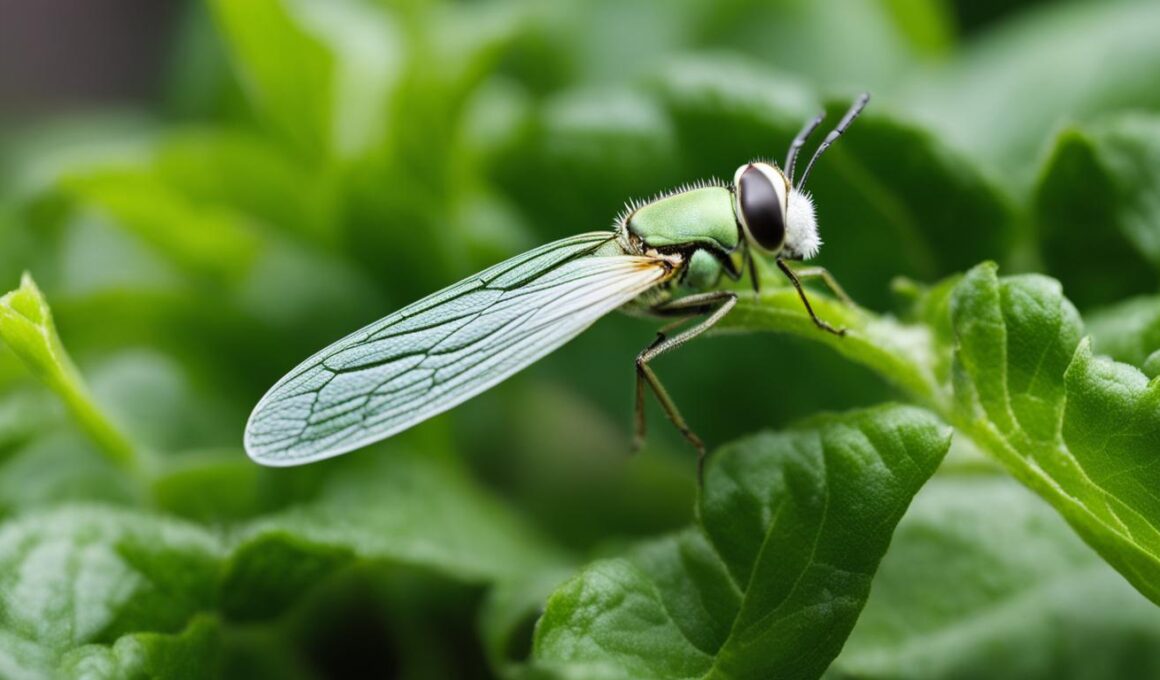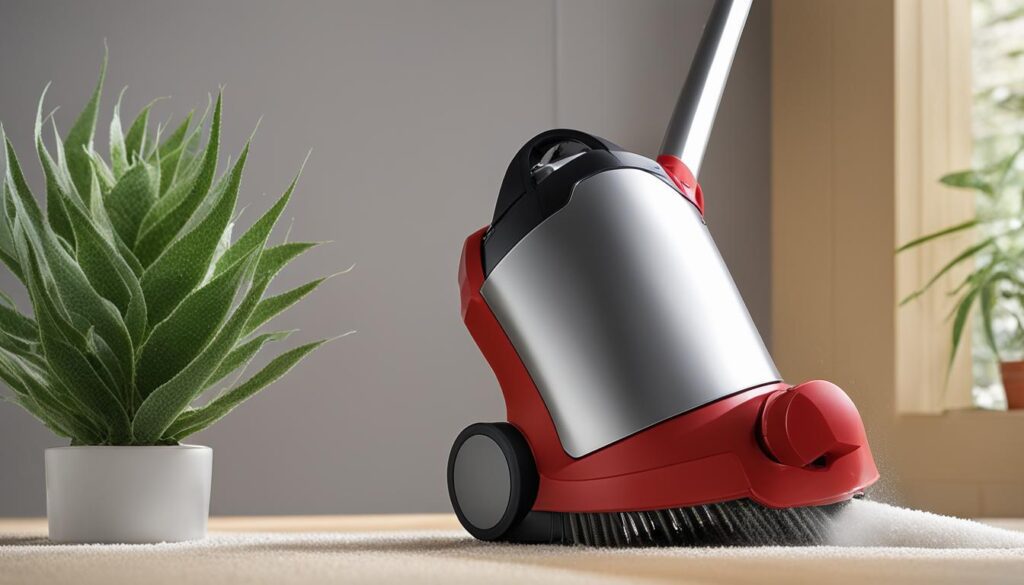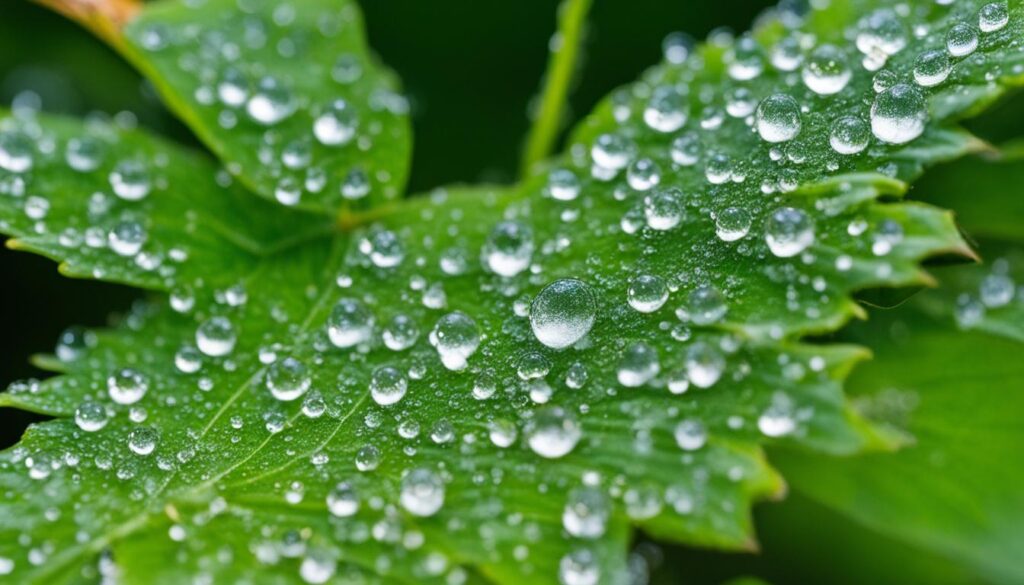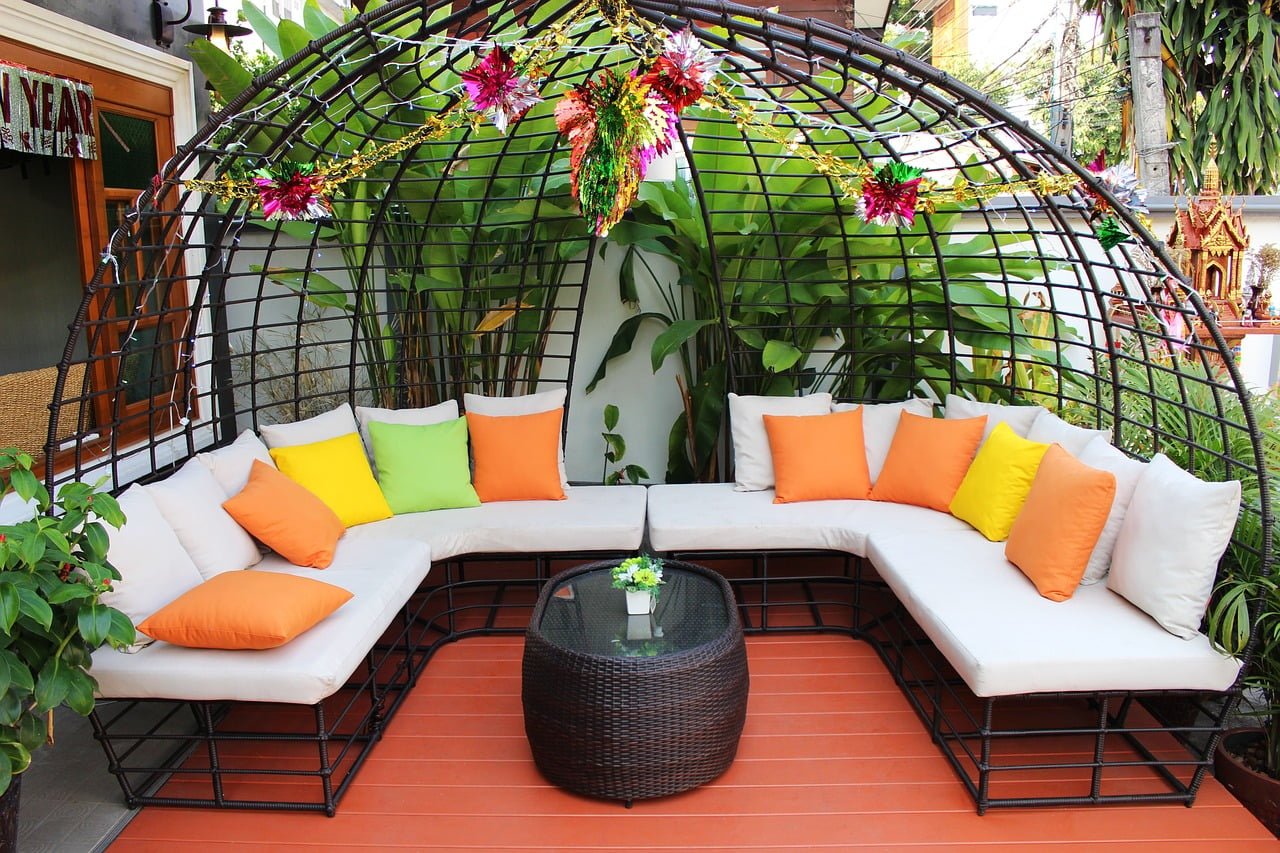Whiteflies are tiny insects that can be destructive to plants, causing leaves to yellow and fall off. They are common in South Florida and can be a menace to gardens and crops. However, there are natural methods you can use to control and get rid of white flies on your plants. From vacuuming them up to using soapy water and attracting natural predators, there are multiple eco-friendly options to choose from. By following these natural white fly treatments, you can protect your plants and maintain a pest-free garden.
Key Takeaways:
- Whiteflies can damage plants by causing leaves to yellow and fall off.
- Vacuuming whiteflies can be an effective method to control their population.
- Removing infested leaves helps prevent further infestation.
- Using soapy water can kill whiteflies on plants.
- Implementing preventative measures can help maintain a pest-free garden.
Vacuuming Whiteflies for Effective Control
Whiteflies can quickly become a nuisance for your plants, causing damage and hindering their growth. One effective and natural method to control whiteflies is by vacuuming them up. This technique helps to remove both adult whiteflies and their eggs, reducing the overall population and preventing further infestation.
Tips for Effective Vacuuming:
- Use a small handheld vacuum cleaner to target whiteflies on your plants.
- Vacuum in the morning when whiteflies are slower-moving.
- Focus on areas where whiteflies are most prevalent.
- Be thorough and vacuum all parts of the plant, including both the upper and undersides of leaves.
Once you have vacuumed up the whiteflies, it is important to properly dispose of them and their eggs. Seal the contents of the vacuum bag in a plastic bag and freeze it for 24 hours. Freezing will ensure that the whiteflies and their eggs are killed, preventing any potential reinfestation.
“Vacuuming is a simple yet effective method for controlling whiteflies on plants. It helps to reduce their population and prevent them from causing further damage. Remember to be diligent and consistent in your vacuuming efforts to keep whiteflies in check.”
By regularly vacuuming your plants, especially during the early stages of infestation, you can effectively control whiteflies and protect the health of your garden. This natural approach is safe for your plants and the environment, making it an ideal solution for eco-conscious gardeners.
Removing Infested Leaves to Prevent Infestation
If you notice whiteflies infesting your plants, one effective natural method to prevent further infestation is to remove the individual infested leaves. Inspect the underside of the leaves for eggs, nymphs, and larvae, and promptly remove them to stop the whiteflies from spreading. Thoroughly check the entire plant and ensure that you remove all infested leaves to prevent any hidden whitefly populations from causing a full-blown outbreak.
By removing infested leaves, you not only eliminate the current whitefly infestation but also disrupt the life cycle of these pests. Whiteflies lay their eggs on the leaves, and the nymphs and larvae feed on the plant sap, causing damage to the leaves and attracting additional whiteflies. By removing the infested leaves, you remove the source of food and breeding grounds for the whiteflies, significantly reducing the risk of a widespread infestation.
In cases where a plant is heavily infested or has died due to whitefly infestation, it is crucial to take immediate action. Remove and destroy the entire host plant to prevent the whiteflies from spreading to nearby plants. This drastic measure eliminates the whitefly population and prevents them from causing further damage to your garden or neighboring plants. Remember to dispose of the infected plant material properly, either by burning it or placing it in sealed bags and throwing it away.
Using Soap and Water for Effective Whitefly Control
Soap and water can be a highly effective natural method to control whiteflies on your plants. This simple yet powerful solution can help you eliminate these pests without resorting to harmful chemicals. To create a soapy water solution, mix one tablespoon of liquid dish soap with a gallon of water. Then, transfer the solution to a spray bottle for easy application.
When spraying the affected plants, make sure to focus on the areas with whitefly infestation, such as the underside of leaves. For best results, apply the soapy water early in the morning or evening when the whiteflies are most active. The soap in the solution disrupts the insect’s protective waxy coating, causing them to dehydrate and die.
If you find that the soapy water solution is abrasive to your plants, consider purchasing a natural insecticidal soap specifically designed for controlling whiteflies. These products are formulated to be safe for your plants while effectively eliminating whiteflies and other common garden pests. Follow the instructions provided on the product label for best results.
Implementing Preventative Measures for Whitefly Control
To prevent whitefly infestation and maintain healthy plants, it is important to implement preventative measures. By following these guidelines, you can create an environment that deters whiteflies and attracts natural predators, helping to maintain a pest-free garden.
Proper Plant Care
One of the most effective ways to prevent whitefly infestation is to keep your plants healthy. Provide them with the right amount of water, sunlight, and nutrients, as this will make them less susceptible to whiteflies. Avoid overwatering, as moist conditions can attract pests.
Regular Inspections
Regularly inspect your plants for any signs of whitefly presence. Look for yellowing leaves, sticky residue on the leaves, or the small white insects themselves. If you notice any signs of infestation, take action immediately to prevent the spread to other plants.
Attracting Natural Predators
Creating a habitat that supports the presence of natural predators can help control whitefly populations. Ladybugs, lacewings, and parasitic wasps are all natural enemies of whiteflies. Planting flowers and herbs that attract these predators, such as marigolds and dill, can help keep whitefly populations in check.
By implementing these preventative measures, you can protect your plants from whitefly infestation and maintain a healthy garden. Proper plant care, regular inspections, and attracting natural predators are all key steps in preventing whitefly outbreaks.
Conclusion
In conclusion, implementing natural whitefly treatments can effectively control and get rid of whiteflies on your plants. By utilizing methods such as vacuuming, removing infested leaves, using soap and water, and implementing preventative measures, you can reduce the whitefly population and maintain a pest-free garden.
Vacuuming whiteflies in the morning can help to control their population, especially when done early in the infestation before they have a chance to lay eggs. Removing infested leaves from affected plants prevents further infestation and destroying heavily infested or dead host plants is crucial to prevent whitefly spread. Utilizing a soapy water solution or insecticidal soap can effectively kill whiteflies while being safe for your plants.
Additionally, maintaining healthy plants by providing proper care and attracting natural predators like ladybugs, lacewings, and parasitic wasps can help prevent whitefly infestation. Regularly inspecting your plants for signs of whitefly presence and taking immediate action is key to maintaining a pest-free garden. By following these natural whitefly treatments and implementing preventative measures, you can protect your plants from the damaging effects of whiteflies and enjoy a healthy, thriving garden.
Are the Natural Methods to Get Rid of White Fly on Plants Also Effective Against Hornworms?
Yes, natural methods for preventing hornworms in garden, such as companion planting with marigolds or dill and using neem oil or Bacillus thuringiensis (BT) spray, can also be effective against white fly on plants. These control methods help to deter pests and protect the health of the plants.
FAQ
How can I control whiteflies on my plants naturally?
There are several natural methods you can use to control whiteflies on your plants. Some options include vacuuming them up, removing infested leaves, using soapy water, and implementing preventative measures.
How effective is vacuuming for whitefly control?
Vacuuming can be an effective method for reducing the whitefly population on your plants. Use a small handheld vacuum cleaner to suck up adult whiteflies in the morning when they are slower-moving. Freezing the sealed vacuum bag for 24 hours will kill the bugs.
Why should I remove infested leaves to prevent whitefly infestation?
Infested leaves can harbor whitefly eggs, nymphs, and larvae, allowing the infestation to spread. By removing individual infested leaves and checking the plants thoroughly, you can prevent further infestation and limit the whitefly population.
How can I use soap and water for whitefly control?
Mix one tablespoon of liquid dish soap with a gallon of water to create a soapy solution. Spray the affected plants, focusing on the areas with whitefly infestation, early in the morning or evening. The soapy water will kill the whiteflies while being safe for the plants.
What preventative measures can I implement to control whiteflies?
To prevent whitefly infestation, keep your plants healthy by providing proper water, sunlight, and nutrients. Regularly inspect your plants for any signs of whiteflies and attract natural predators like ladybugs, lacewings, and parasitic wasps by creating a habitat that supports their presence.










